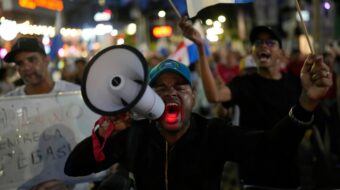Cinco de Mayo is an important national holiday for the Mexican people. It is a celebration of the victory of freedom and national sovereignty. Often, commemorations focus on the military victory by a Mexican people’s army over a larger force of well-trained French troops in the battle of Puebla on May 5, 1862. But a look at the whole story finds important parallels for our own time, for Mexico, and for others.
After Mexico won its independence from Spain in 1821, big landowners and the Roman Catholic Church hierarchy came into power.
Many Mexicans supported a reform movement led by Benito Juarez that sought to break the power of the landowners and the church. Civil war ensued, with a victory by Juarez in 1860. Juarez began to carry out land reform, breaking up large estates, introducing secular education, and enforcing the separation of church and state.
But, Juarez faced huge problems. Mexico was broke. Conservative governments had financed themselves by borrowing abroad, on conditions highly unfavorable to Mexico. Juarez announced a moratorium on payments on foreign debts to give the new government some breathing space and ability to implement its program.
France, Britain, and Spain, the main creditors, sent armies to collect the debt. But France had another agenda – to conquer Mexico – an agenda Spain and Britain did not share. They withdrew, but the French marched on to Puebla and lost in the historic May 5 battle.
Unfortunately, the French did not give up. They replaced their commander, sent more troops, and conquered Puebla and then Mexico City. Eventually, they conquered almost all of Mexico and Juarez became a refugee in his own country.
But Juarez did not give up either, and when the Civil War in the United States ended in 1865, he managed to get U.S. diplomatic pressure to help persuade Napoleon III to cut his losses and pull the French army out.
Today, many Third-World countries suffer from a choking debt burden. Movements across the globe have developed to demand that these debts be abolished. Cuba argues that Third World countries have paid these debts numerous times over with their labor and natural resources. Conditions imposed by the “creditors” only make conditions worse for these countries and peoples.
For example, Mexico’s leaders planned to turn their country into a “First World” economic power by means of the petroleum industry. They borrowed heavily from abroad. But in the 1980s the price of petroleum dropped, and soon Mexico was broke again. The International Monetary Fund and the World Bank demanded that Mexico implement a “neo-liberal” economic program, involving privatization of government institutions, cuts in the social safety net, and “free trade.” Mexico re-privatized the banks, which had previously been nationalized. Living standards for the majority of Mexicans began to decline, leading to popular discontent. Corruption, including in elections, became rampant.
In 1994, the “free trade” part of the neo-liberal program was implemented when NAFTA, the North American Free Trade Agreement, was signed by Mexico, the U.S., and Canada. The terms of NAFTA meant the gutting of Article 27 of the Mexican constitution, which had guaranteed most land would remain in the hands of local farm communities and not foreign investors.
Initially, NAFTA brought a lot of foreign investment to Mexico. But in 1995 there was a near economic collapse because of a run by investors on “tesobonos,” treasury bonds, which were sold on highly favorable terms to investors, who then cashed in because of fears about Mexico’s stability. Mexico had to go hat in hand to the Clinton administration to get a “bailout,” on unfavorable terms.
Free trade in agriculture has driven six million Mexican farm people off the land, drastically lowering the living standards of millions and stimulating greatly increased emigration to the United States. Vast numbers of Mexican industrial workers lost their jobs when Mexican-owned industries were driven out of business by U.S. competition.
In 2000, Mexican voters threw the Institutional Revolutionary Party, PRI, out of office and elected Vicente Fox as president. Fox, a former Coca-Cola executive, has intensified the right-wing neo-liberal policies begun by his PRI predecessors.
Cinco de Mayo celebrations across the U.S. and Mexico are an opportunity to deepen our understanding of the inequalities caused by imperialism and debt, and to redouble anti-imperialist solidarity, upholding the principle of national sovereignty for Mexico and other countries. Que viva el Cinco de Mayo!










